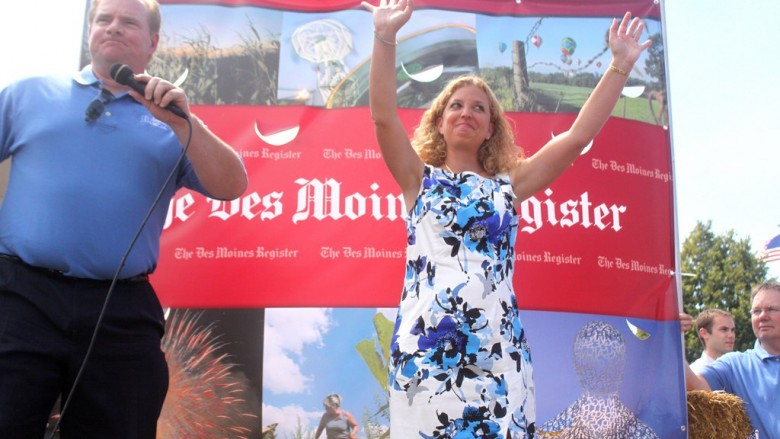Webb joins critics of Democratic presidential nominating course
By Evan Lips | October 16, 2015, 17:55 EDT
 Democratic National Committee Chairwoman Debbie Wasserman Schultz (Courtesy Gage Skidmore/Flickr)
Democratic National Committee Chairwoman Debbie Wasserman Schultz (Courtesy Gage Skidmore/Flickr) Another Democratic presidential candidate has joined former Maryland Gov. Martin O’Malley in claiming that the party’s nominating process is rigged in favor of frontrunner Hillary Clinton, while recent rumblings inside the Democratic National Committee suggest signs of additional fractures.
Democratic candidate and former Virginia Sen. Jim Webb veered from discussing international affairs to answer a question about Tuesday’s debate, speaking before the New York-based Council on Foreign Relations Thursday night. The nonprofit council is a research organization specializing in international affairs.
Webb cited the CNN program’s format as favoring certain candidates in terms of on-camera time, in response to a comment about his performance by Karl Rove, a former George W. Bush adviser. In a television appearance focused on the debate, Rove had described Webb, who is also a former Navy secretary under President Ronald Reagan, as an “angry Jim Webb who spent the evening complaining.”
Webb had spent much of his less-than 15 minutes on camera during the Las Vegas debate saying he hadn’t been given enough time to speak. He told the council that the CNN moderator provided him with no other option.
“I’m going to be very frank, it was rigged in terms of who was going to get the time on the floor by the way that Anderson Cooper was selecting people to supposedly respond to something someone else said,” Webb pointed out.
The evening forum lasted about two hours.
Webb’s comments echoed a claim about a rigged process that a frustrated O’Malley made at the Democratic National Committee’s summer meeting in Minneapolis. O’Malley, addressing hundreds at the August gathering, complained about the dearth of scheduled primary debates and described his party’s method of determining a presidential nominee as a “sort of rigged process that’s never been attempted before.”
On the same day Webb spoke before the council, an unnamed female DNC member told the U.K.’s Daily Mail that the party is “clearing a path” for Clinton.
“The party’s female leaders really want to make a woman the next president,” the woman said, referring to the former secretary of state. The woman, who is backing a Clinton rival, said she worried that party leaders would deliver the nomination to Clinton only to see her implode in the general election campaign.
Rebellion brewing?
Those comments appear to be aimed at U.S. Rep. Debbie Wasserman Schultz (D-Fla.), the party’s top boss. U.S. Rep. Tulsi Gabbard (D-Hawaii), one of the DNC’s five vice chairs, has been a vocal critic of Wasserman Schultz’s handling of the nomination process. Gabbard did not attend the debate and instead watched from home.
Gabbard and fellow vice chair R.T. Rybak, a former Minneapolis mayor, have repeatedly called on Democrats to oppose Wasserman Schultz’s edict limiting the number of Democratic debates to six. During the 2008 presidential primary, the party’s candidates — including Clinton — squared off in 27 of the forums. Wasserman Schultz declared earlier this year that any candidates who participate in unapproved debates will be barred from those sponsored by the DNC.
Ahead of the Oct. 13 forum, Gabbard claimed Wasserman Schultz had made it clear she was “no longer welcome to come” to it as a result of her public calls for more debates, in media interviews from her Hawaii home.
Gabbard this week has used her personal Twitter account to re-tweet news reports critical of Wasserman Schultz. Gabbard also took to Twitter during Tuesday’s debate to rip Clinton’s handling of Libya during her time at the helm of the State Department.
Overthrowing Gaddafi created a vacuum so ISIS, al-Qaeda, and other Islamic extremists took over, wreaking chaos and terror #DemDebate
— Tulsi Gabbard (@TulsiGabbard) October 14, 2015
Gabbard also targeted CNN’s Chris Cuomo, a son of liberal icon Mario Cuomo, the late Democratic governor of New York, after the network journalist asked on Twitter if it mattered whether or not Wasserman Schultz consulted with other DNC officials ahead of setting the debate schedule:
@ChrisCuomo I may be an idealist but I expect our leaders to tell the truth. Of course it matters. This is why people don’t vote #democracy
— Tulsi Gabbard (@TulsiGabbard) October 15, 2015
Gabbard and Ryback have disputed Wasserman Schultz’s claim that she included senior party officials in debate-planning discussions. Ryback has told reporters that Wasserman Schultz’s claim is “flat-out not true.”
“She presented this to us as a fait accompli, as she was about to go out and announce it to the whole committee,” Ryback said about Wasserman Schultz during an interview with Bloomberg News. “I said to her, ‘Well at least there’s some way you can explain why you came to that decision.’ She didn’t even do that. She gaveled people out of order without any explanation.”
Spinning a Webb of accusations
Webb’s post-debate claim of being marginalized by CNN moderator Cooper revolves around his assertion that the on-stage discussion was handled in such a way that candidates could only speak in response to a question or remark mentioning them by name.
“The debate was being portrayed as a showdown between Mrs. Clinton and Bernie,” Webb said, referring to Vermont U.S. Sen. Bernie Sanders, Clinton’s closest rival in likely voter polls. “If you’re going to be invited to participate and people are going to judge whether you ‘won’ or not, as least you should be able to have the kind of time that’s necessary to discuss the issues that you care about.”
Webb logged 14 minutes and 23 seconds of camera time during the debate. Clinton, by comparison, got more than 30 minutes. Sanders clocked nearly 27 minutes. O’Malley had about 16.
Webb also said that he pleaded with Sanders, who stood at the next podium, to mention his name when making comments, to give him a chance to speak.
“I even turned around to Bernie Sanders at one point and said, ‘Bernie, say my name, will you,’” Webb recalled. “So you know, in that kind of an environment, I was either going to be Mr. Angry or I was going to be a potted plant.”
“That was the only way to get into the conversation.”
Contact Evan Lips at [email protected] or @evanmlips on Twitter.









